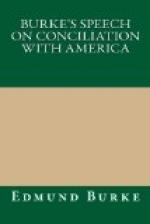[Footnote: 2. When I first had the honor. Burke was first elected to Parliament Dec. 26, 1765. He was at the time secretary to Lord Rockingham, Prime Minister. Previous to this he had made himself thoroughly familiar with England’s policy in dealing with her dependencies—notably Ireland.]
[Footnote: 3. my original sentiments. After many demonstrations both in America and England the Stamp Act became a law in 1765. One of the first tasks the Rockingham ministry set itself was to bring about a repeal of this act. Burke made his first speech in support of his party. He argued that the abstract and theoretical rights claimed by England in matters of government should be set aside when they were unfavorable to the happiness and prosperity of her colonies and herself. His speech was complimented by Pitt, and Dr. Johnson wrote that no new member had ever before attracted such attention.]
[Footnote: 4. America has been kept in agitation. For a period of nearly one hundred years the affairs of the colonies had been intrusted to a standing committee appointed by Parliament. This committee was called “The Lords of Trade.” From its members came many if not the majority of the propositions for the regulation of the American trade. To them the colonial governors, who were appointed by the king, gave full accounts of the proceedings of the colonial legislatures. These reports, often colored by personal prejudice, did not always represent the colonists in the best light. It was mainly through the influence of one of the former Lords of Trade, Charles Townshend, who afterwards became the leading voice in the Pitt ministry, that the Stamp Act was passed.]
[Footnote: 5. a worthy member. Mr. Rose Fuller.]
[Footnote: 6. former methods. Condense the thought in this paragraph. Are such “methods” practised nowadays?]
[Footnote: 7. paper government. Burke possibly had in mind the constitution prepared for the Carolinas by John Locke and Earl of Shaftesbury. The scheme was utterly impracticable and gave cause for endless dissatisfaction.]
[Footnote: 8. Refined policy. After a careful reading of the paragraph determine what Burke means by “refined policy.”]
[Footnote: 9. the project. The bill referred to had been passed by the House on Feb. 27. It provided that those colonies which voluntarily voted contributions for the common defence and support of the English government, and in addition made provision for the administration of their own civil affairs, should be exempt from taxation, except such as was necessary for the regulation of trade. It has been declared by some that the measure was meant m good faith and that its recognition and acceptance by the colonies would have brought good results. Burke, along with others of the opposition, argued that the intention of the bill was to cause dissension and division among the colonies. Compare 7, 11-12. State your opinion and give reasons.]




